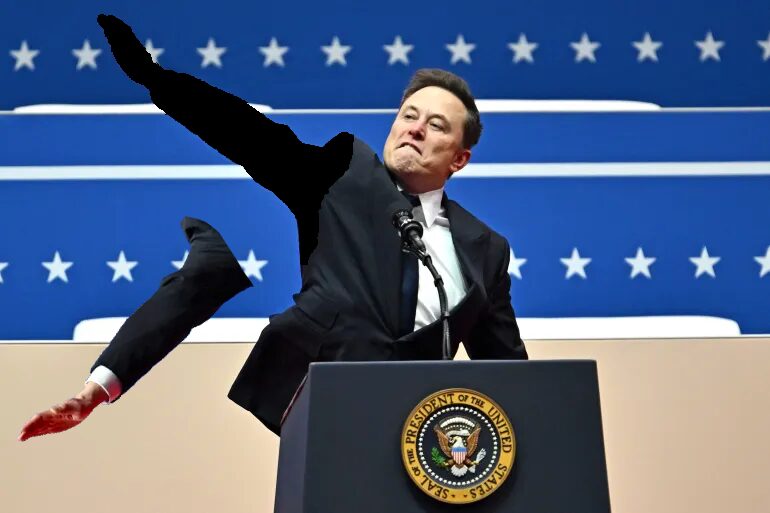There’s a disarming paradox in Elon Musk’s ability to command attention, as though the magnate is more of a weather phenomenon than an individual, a natural event rather than a man. In this narrative, his recent gesture at Donald Trump’s inauguration – a raised arm in a pose that needed no caption – became the epicenter of a media controversy.
The scene unfolded at the Capitol One Arena in Washington during one of the most quintessentially Trumpian celebrations imaginable: an exclusive gathering of world leaders, social media influencers, tech magnates, and politicians, in a ritual where self-celebration mingled with spectacle. Musk, now officially head of the Department of Government Efficiency (a title that seems like a meme born of postmodern chaos), took the stage to thank Trump’s supporters. First, he pounded his chest, then extended his right arm toward the crowd. The gesture was repeated, almost nonchalantly, toward the audience behind him. And that’s where it all began.

The images were broadcast live, exploding across social media and global news outlets with the kind of intensity now customary in discussions involving Musk. Some immediately labeled it a Nazi salute, while others, such as Andrea Stroppa – one of Musk’s staunchest supporters in Italy – were quick to explain it as a manifestation of his autism. “He’s saying, – I want to give you my heart,'” Stroppa declared, though he later deleted a previous tweet ironically celebrating the “Roman Empire.” Musk himself dismissed the accusations as baseless attacks, adding a sardonic remark: “Frankly, they should resort to better dirty tricks.”
The gesture, however one interprets it, is more than just a footnote in the news. It’s a prism that reveals a broader picture, intertwining the dynamics of power, public perception, and the ambiguous role of tech tycoons in contemporary society.
Over the past three decades, tech magnates have been vested with an almost prophetic role. From Steve Jobs to Elon Musk, passing through Bill Gates and Mark Zuckerberg, these men – because they are almost always men – have been seen as visionaries capable of leading us toward a future that only they could foresee. In an era of unprecedented technological acceleration, they were thought to possess the keys to guide global transformations.
But if we look at the result of this narrative today, we cannot ignore an uncomfortable truth: the promise of an anthropological revolution through technology remains largely unfulfilled. Smartphones, social media, and artificial intelligence have undoubtedly transformed our way of life, but they haven’t made us wiser, more empathetic, or better as a species. On the contrary, technologies have often amplified our vulnerabilities: political polarization, disinformation, and the erosion of privacy.
In this context, Musk’s gesture – whether conscious or not – almost seems like a metaphor for this disillusionment. What we once would have interpreted as an act of leadership is now a source of confusion, if not concern. The man who wanted to take us to Mars, revolutionize energy, and rewrite the rules of mobility is now a polarizing figure, capable of eliciting both admiration and repulsion. Like a Masaniello who knows how to code.
Perhaps it is time, then, to rethink the role we assign to these new “intellectuals” of our time. Because that is what they have become: a ruling class that, instead of writing books or debating in cultural salons, builds platforms, launches rockets, and redesigns algorithms. But the crucial question we have postponed for too long is: is technical expertise enough to guide the world toward a better future? Or perhaps – as the growing disenchantment with these figures suggests – we need to return to a more humanistic vision, capable of balancing technological progress with profound ethical and social reflection?

The lesson from this story isn’t just about Elon Musk or his gesture. It’s about our tendency, as a society, to seek simple answers in extraordinary figures, to project onto them hopes that no human being can realistically fulfill. Technology alone cannot save us. As Musk’s ambiguous gesture demonstrates, it is often a mirror of our contradictions rather than a way out of them. To address the challenges of our time, from climate change to the democratic crisis, we need to rediscover the power of ideas and critical thinking, of a narrative that knows how to unite progress and humanity.
Perhaps this is the most important message we can draw from this episode: not the condemnation or absolution of Musk, but the awareness that our future cannot be left in the hands of those who design machines without questioning the destiny of mankind.
–
Studied psychology and joined the editorial staff of VICE Italia in 2013 as an editor and staff writer, where he remained until the magazine closed. Over the years he has also written for Esquire, Rolling Stone, GQ and Ultimo Uomo. Since October 2024 he has joined the editorial staff of The Bunker.